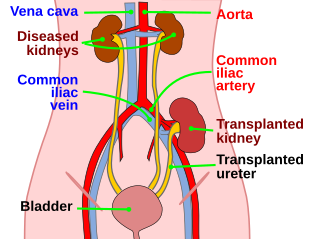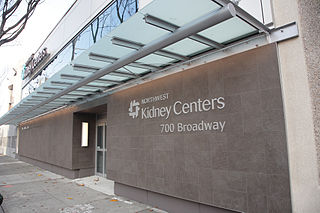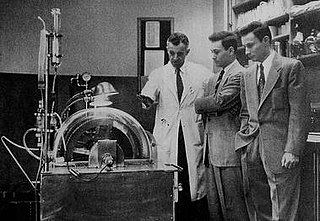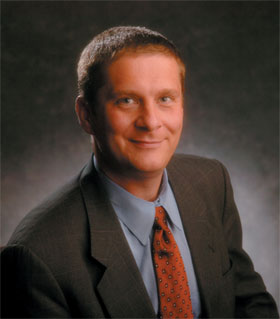Related Research Articles

Virginia Commonwealth University (VCU) is a public research university in Richmond, Virginia. VCU was founded in 1838 as the medical department of Hampden–Sydney College, becoming the Medical College of Virginia in 1854. In 1968, the Virginia General Assembly merged MCV with the Richmond Professional Institute, founded in 1917, to create Virginia Commonwealth University. In 2022, more than 28,000 students pursued 217 degree and certificate programs through VCU's 11 schools and three colleges. The VCU Health System supports health care education, research, and patient care. It was the only school in the South to have graduated a class every year during the Civil war.

Kidney transplant or renal transplant is the organ transplant of a kidney into a patient with end-stage kidney disease (ESRD). Kidney transplant is typically classified as deceased-donor or living-donor transplantation depending on the source of the donor organ. Living-donor kidney transplants are further characterized as genetically related (living-related) or non-related (living-unrelated) transplants, depending on whether a biological relationship exists between the donor and recipient. The first successful kidney transplant was performed in 1954 by a team including Joseph Murray, the recipient's surgeon, and Hartwell Harrison, surgeon for the donor. Murray was awarded a Nobel Prize in Physiology or Medicine in 1990 for this and other work. In 2018, an estimated 95,479 kidney transplants were performed worldwide, 36% of which came from living donors.

The University of Alabama at Birmingham Marnix E. Heersink School of Medicine is the medical school of the University of Alabama at Birmingham (UAB) located in Birmingham, Alabama, United States with branch campuses in Huntsville, Montgomery, and Tuscaloosa. Residency programs are also located in Selma, Huntsville, and Montgomery. It is part of the University of Alabama at Birmingham (UAB) and the UAB Health System, one of the largest academic medical centers in the United States.

Northwest Kidney Centers is a regional, not-for-profit community-based provider of kidney dialysis, public health education, and research into the causes and treatments of chronic kidney disease. Established in Seattle in 1962, it was the world's first out-of-hospital dialysis provider. It offers dialysis throughout the greater Seattle area in 20 free-standing clinics, eight hospitals and its home dialysis program. It opened its first clinic in Everett in 2020, the organization's first in Snohomish county.
Carl William Gottschalk was the Kenan Professor and Distinguished Research Professor of Medicine at the University of North Carolina at Chapel Hill. Gottschalk made important discoveries about the function of the kidneys, and helped set government policies that provided dialysis to patients with kidney failure.
Dialysis Clinic, Inc. is a nonprofit medical corporation founded in 1971 and chartered as a 501(c)(3) tax-exempt organization under IRS regulations.

John Putnam Merrill was an American physician and medical researcher. He led the team which performed the world's first successful kidney transplant. He generally credited as the "father of nephrology" or "the founder of nephrology," which is the scientific study of the kidney and its diseases.

The Virginia Commonwealth University School of Medicine is the medical school of Virginia Commonwealth University, a public research university in Richmond, Virginia. It is the largest and oldest continuously operating medical school in Virginia. The school traces its beginnings to the 1838 opening of the medical department of Hampden–Sydney College, which in 1854 became an independent institution known as the Medical College of Virginia (MCV). In 1968, MCV joined with the Richmond Professional Institute to form Virginia Commonwealth University. The School of Medicine is one of six schools on VCU's MCV Campus, which includes the VCU Medical Center and Children's Hospital of Richmond at VCU.

The VCU Medical Center, formerly known as the Medical College of Virginia (MCV), is the medical campus of Virginia Commonwealth University (VCU), located in downtown Richmond, Virginia, United States. As MCV, VCU Medical Center merged with the Richmond Professional Institute in 1968 to create VCU. In the 1990s, the Medical College of Virginia Hospitals Authority was created to oversee MCV Hospitals. In 2004, the name of this authority was changed to the VCU Health System, and the MCV Hospitals and surrounding campus were named the VCU Medical Center. The authority oversees the employees and real estate occupied by the five schools within the VCU Medical Center. It was at this time that the MCV Campus moniker was created.

Francis L. Delmonico, MD, FACS is an American surgeon, clinical professor and health expert in the field of transplantation. He serves on numerous committees and is affiliated with various leading organizations and institutions. He is the chief medical officer of the New England Organ Bank (NEOB) and Professor of Surgery, Part-Time at Harvard Medical School in Boston, Massachusetts, where he is emeritus director of renal transplantation. He served as president of The Transplantation Society (TTS) from 2012 to 2014, an international non-profit organization based in Montreal, Canada that works with international transplantation physicians and researchers. He also served as the president of the United Network of Organ Sharing (UNOS) in 2005, which overseas the practice of organ donation and transplantation in the United States. He was appointed and still serves as an advisor to the World Health Organization in matters of organ donation and transplantation. He was appointed by Pope Francis to the Pontifical Academy of Science in 2016. In 2020, he became the recipient of the Medawar Prize of The Transplantation Society.
Samuel Lee Kountz Jr. was an African-American kidney transplantation surgeon from Lexa, Arkansas. He was most distinguished for his pioneering work in the field of kidney transplantations, and in research, discoveries, and inventions in Renal Science. In 1961, while working at the Stanford University Medical Center, he performed the first successful Kidney transplant between humans who were not identical twins. Six years later, he and a team of researchers at the University of California, San Francisco, developed the prototype for the Belzer kidney perfusion machine, a device that can preserve kidneys for up to 50 hours from the time they are taken from a donor's body. It is now standard equipment in hospitals and research laboratories around the world.
The School of Nursing at Virginia Commonwealth University offers academic programs from the baccalaureate to doctoral level. Established in 1893, the School is part of a leading academic health sciences center on the Medical College of Virginia (MCV) Campus. Programs include: Baccalaureate: Traditional B.S., Accelerated B.S., and RN to B.S. (online); Master's - Family NP, Adult-gerontology Primary Care NP, Adult-gerontology Acute Care NP, Psychiatric and Mental Health NP, and Nursing Administration and Leadership (online); Post-master's Certificates; and Doctoral - Ph.D. and DNP.

Timothy J. Broderick, F.A.C.S., is Professor of Surgery and Biomedical Engineering at the University of Cincinnati, where he has been on the faculty since 2003. He also is Chief of the Division of Gastrointestinal and Endocrine Surgery and is Director of the Advanced Center for Telemedicine and Surgical Innovation (ACTSI). He has flown on the NASA KC-135 parabolic laboratory and dived in the NASA Extreme Environment Mission Operations (NEEMO) program to develop advanced surgical technologies for long duration space flight.
The history of Virginia Commonwealth University began in 1838, when the Medical College of Virginia was founded. In 1967 the Medical College of Virginia and the Richmond Professional Institute merged to become one, single university in Richmond, Virginia. Five presidents have served the institution since its merger and creation. VCU's medical school is the oldest continually operating medical school in the South; it created the first school of Social work in the South; and it is has the only school of dentistry in Virginia
Founded in 1974, VCU Massey Comprehensive Cancer Center is a non-profit organization part of Virginia Commonwealth University. Located in Richmond, Virginia, Virginia Commonwealth University is one of the nation's top research universities, and VCU Medical Center, a leading academic health system ranked Virginia's top hospital by U.S. News & World Report in 2012.

The George Mason–VCU rivalry is a college sports rivalry between the VCU Rams of Virginia Commonwealth University and the George Mason Patriots of George Mason University. Both universities are present members of the Atlantic 10 Conference, and for a majority of their rivalry history, members of the Colonial Athletic Association.
Ramesh Kumar MRCP, FRCP is the first Indian Member of Royal College of Physicians (MRCP in Kidney diseases and a pioneer of nephrology in India and South Asia. He was awarded the Padma Shri in 1992 and the Padma Bhushan in 2003 by the president of India for his pioneering, notable and continued contributions to Nephrology.
Sarbeswar Sahariah is an Indian nephrologist and organ transplant specialist, known for his expertise in renal and pancreatic transplantation. He was honoured by the Government of India, in 2014, by bestowing on him the Padma Shri, the fourth highest civilian award, for his contributions to the field of medicine. Sahariah is credited with more than 3000 renal transplantations, which many consider, has made him the most prolific kidney transplant surgeon in the country.

Western Hospital is a private hospital located in Colombo 8, Sri Lanka that specializes in renal disease care, dialysis and transplantation. Initially opened to provide kidney care services to Sri Lankan patients, Western Hospital has now diversified to providing general health care services, and is one of the many private hospitals in Colombo, Sri Lanka. As of December 2022, the hospital is currently accused of involvement in duping organ donors into donating their kidneys. The hospital management has denied involvement in any such selling/buying of organs, which might or might not have occurred between donors and receivers.

Michael L. Hess was an American professor of cardiology and physiology at the Medical College of Virginia (MCV) who was instrumental in founding the International Society for Heart and Lung Transplantation (ISHLT), of which he served as its first president.
References
- ↑ "Humeral Surgical Society". vcu.edu. Archived from the original on 2015-09-06. Retrieved 2015-07-05.
- ↑ "About Dr. David Hume". vcu.edu. Archived from the original on 2015-09-09.
- ↑ "Dr. David M. Hume, a Developer Of Transplant Techniques, Dies". The New York Times. 1973-05-21. ISSN 0362-4331 . Retrieved 2024-07-04.
- ↑ "Aircraft Tail number N6191X". Federal Aviation Administration. Retrieved 10 July 2021.
- ↑ "Crash of a Rockwell Aero Commander 560F in Granada Hills: 1 killed". Bureau of Aircraft Accidents. Retrieved 16 July 2021.
- ↑ "Our Namesakes | HumeLee Transplant Center". www.vcuhealth.org. Retrieved 2021-07-26.
- ↑ "David M. Hume Memorial Award". kidney.org.